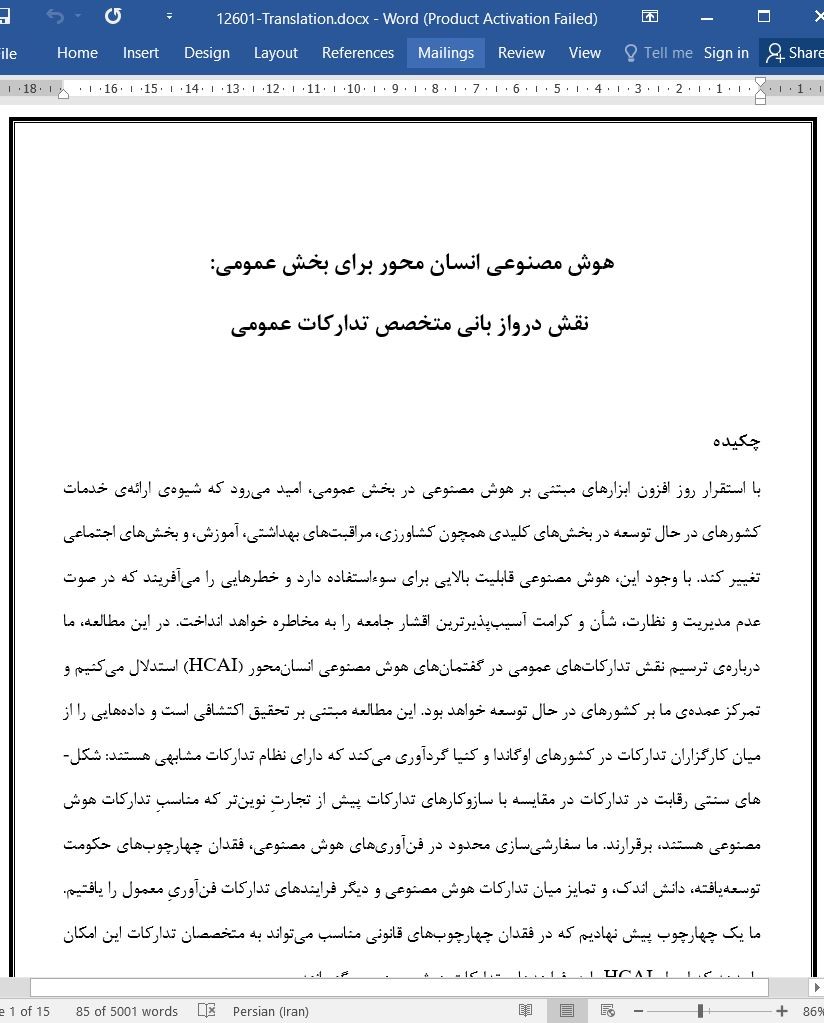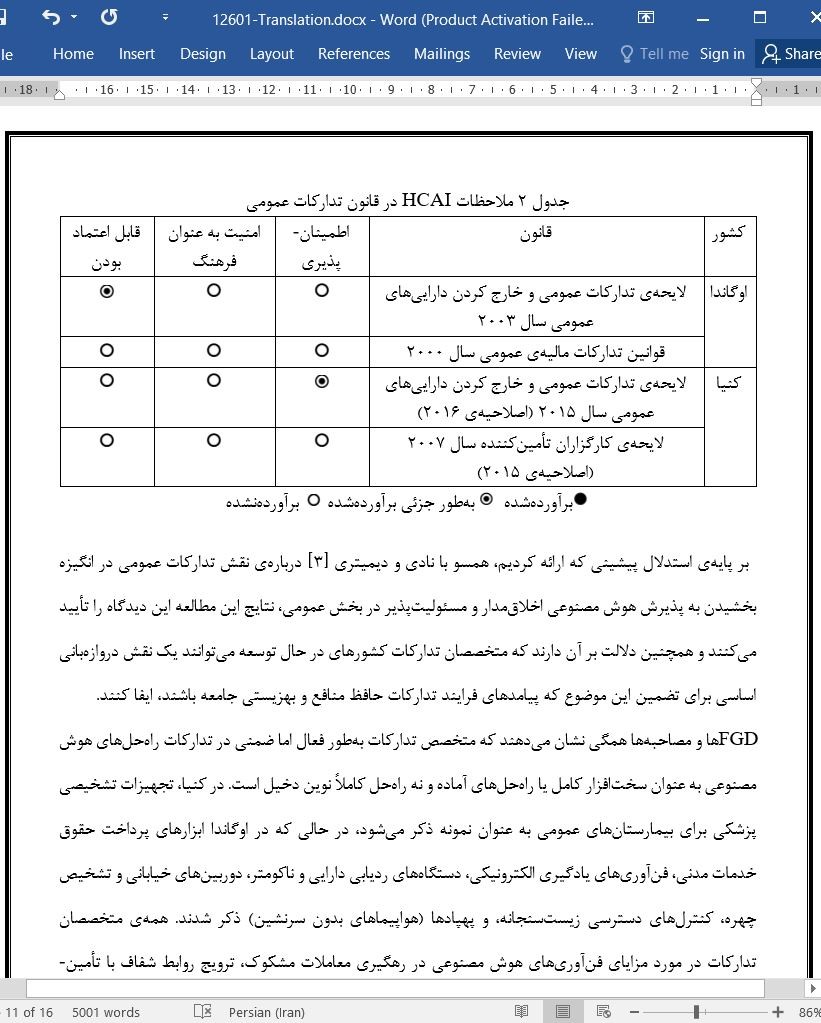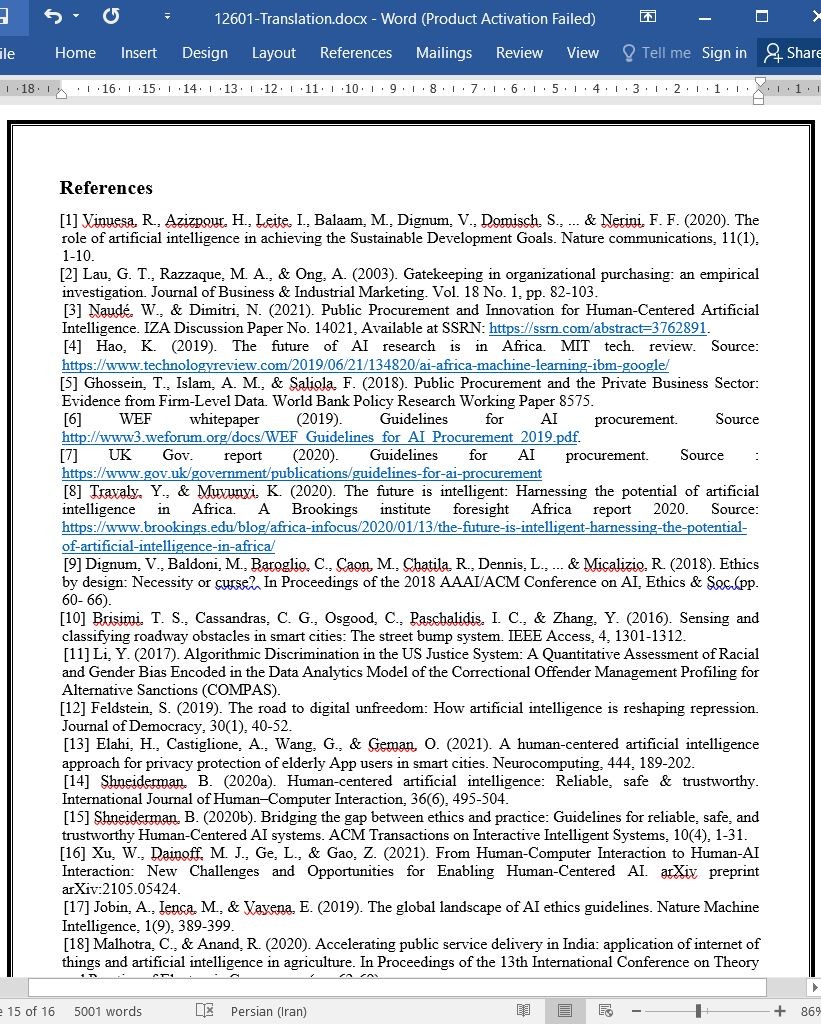
هوش مصنوعی انسان محور برای بخش عمومی
چکیده
با استقرار روز افزون ابزارهای مبتنی بر هوش مصنوعی در بخش عمومی، امید می رود که شیوه ی ارائه ی خدمات کشورهای در حال توسعه در بخش های کلیدی همچون کشاورزی، مراقبت های بهداشتی، آموزش، و بخش های اجتماعی تغییر کند. با وجود این، هوش مصنوعی قابلیت بالایی برای سوءاستفاده دارد و خطرهایی را می آفریند که در صوت عدم مدیریت و نظارت، شأن و کرامت آسیب پذیرترین اقشار جامعه را به مخاطره خواهد انداخت. در این مطالعه، ما درباره ی ترسیم نقش تدارکات های عمومی در گفتمان های هوش مصنوعی انسان محور (HCAI) استدلال می کنیم و تمرکز عمده ی ما بر کشورهای در حال توسعه خواهد بود. این مطالعه مبتنی بر تحقیق اکتشافی است و داده هایی را از میان کارگزاران تدارکات در کشورهای اوگاندا و کنیا گردآوری می کند که دارای نظام تدارکات مشابهی هستند: شکل های سنتی رقابت در تدارکات در مقایسه با سازوکارهای تدارکات پیش از تجارتِ نوین تر که مناسبِ تدارکات هوش مصنوعی هستند، برقرارند. ما سفارشی سازی محدود در فن آوری های هوش مصنوعی، فقدان چهارچوب های حکومت توسعه یافته، دانش اندک، و تمایز میان تدارکات هوش مصنوعی و دیگر فرایندهای تدارکات فن آوریِ معمول را یافتیم. ما یک چهارچوب پیش نهادیم که در فقدان چهارچوب های قانونی مناسب می تواند به متخصصان تدارکات این امکان را بدهد که اصول HCAI را در فرایندهای تدارکات هوش مصنوعی بگنجانند.
1- مقدمه
هوش مصنوعی (AI)، یادگیری ماشینی (ML)، و دیگر فن آوری های علوم داده به رایج ترین و پرکاربردترین نوآوری-های سده ی بیست و یکم تبدیل شده اند. از چَت بات ها و دستیاران مجازی، ارزیابی های پزشکی، ترجمه ی زبان، امتیازدهی اعتبار گرفته تا کاربردهای پیچیده تر در تولید و بهینه سازی زنجیره ی تأمین، هوش مصنوعی تعهد مهمی را برای شرکت ها نشان داده است. در کشورهای در حال توسعه، ابزارهای هوش مصنوعی برای حل بزرگ ترین چالش-های توسعه ی پایدار در خدمات آموزش، مراقبت های بهداشتی، زیرساخت عمومی، کشاورزی، و امنیت مورد استفاده قرار می گیرند [1].
4- نتیجه گیری
در این مقاله، ما حکومت فن آوری های هوش مصنوعی در بخش عمومی در کشورهای در حال توسعه را بررسی کردیم. ما نقش متخصص تدارکات به عنوان دروازه بان فرایندهای تدارکات بخش عمومی و دستاورد آن ها در همراستا کردن منافع فروشندگان هوش مصنوعی با منافع مصرف کنندگان هوش مصنوعی را واکاوی کردیم. به ویژه، ما نقش تدارکات عمومی و متخصصان تدارکات در توسعه و استقرار هوش مصنوعی انسان محور (HCAI) را بررسی کردیم. ما مقاله را حول سه اصل HCAI مربوط به اشنایدرمن [14] و اشنایدرمن [16] تدوین کردیم.
Abstract
The increasing deployment of artificial intelligence (AI) powered solutions for the public sector is hoped to change how developing countries deliver services in key sectors such as agriculture, healthcare, education, and social sectors. And yet AI has a high potential for abuse and creates risks, which if not managed and monitored will jeopardize respect and dignity of the most vulnerable in society. In this study, we argue for delineating public procurements’ role in the human-centred AI (HCAI) discourses, focusing on the developing countries. The study is based on an exploratory inquiry and gathered data among procurement practitioners in Uganda and Kenya, which have similar country procurement regimes: where traditional forms of competition in procurement apply compared to more recent pre-commercial procurement mechanisms that suit AI procurement. We found limited customization in AI technologies, a lack of developed governance frameworks, and little knowledge and distinction between AI procurement and other typical technology procurement processes. We proposed a framework, which in absence of good legal frameworks can allow procurement professionals to embed HCAI principles in AI procurement processes.
1. Introduction
Artificial intelligence (AI), machine learning (ML), and other data science technologies have become the most ubiquitous innovations of the 21st century. From chatbots and virtual assistants, medical assessments, language translation, credit scoring to more complex applications in manufacturing and supply chain optimization, AI has shown significant promise for companies. In developing countries, AI tools are being used to address the biggest sustainable development challenges in education services, healthcare, public infrastructure, agriculture, and security [1].
4. Conclusion
In this paper, we examined the governance of artificial intelligence technologies in the public sector in developing countries. We explored the role of the procurement professional as the gatekeeper of the public sector procurement processes and their contribution towards aligning the interests of AI vendors with those of AI consumers. Specifically, we examined the role of public procurement and procurement professionals in the development and deployment of human-centered artificial intelligence – HCAI. We developed the paper around three HCAI principles from Shneiderman [14] and Shneiderman [16].
چکیده
1- مقدمه
1-1 نقش دروازه بانی تدارکات عمومی در پیشینه ی پژوهشی HCAI
2- روش ها
2-1 مواد و روش های گردآوری داده
2-2 تحلیل داده ها
3- نتایج و بحث ها
4- نتیجه گیری
منابع
Abstract
1. Introduction
1.1. Public procurement’s gatekeeping role in the HCAI literature
2. Methods
2.1. Material and data collection methods
2.2. Data analysis
3. Results and discussions
4. Conclusion
References
- اصل مقاله انگلیسی با فرمت ورد (word) با قابلیت ویرایش
- ترجمه فارسی مقاله با فرمت ورد (word) با قابلیت ویرایش، بدون آرم سایت ای ترجمه
- ترجمه فارسی مقاله با فرمت pdf، بدون آرم سایت ای ترجمه



